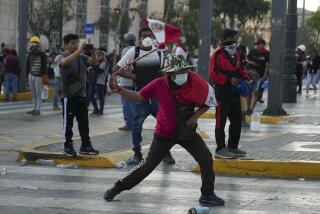Officer Gives Up, Ending Argentine Military Rebellion
BUENOS AIRES — Renegade Lt. Col. Aldo Rico surrendered Monday after skirmishes with loyal government forces, ending a weekend rebellion by disgruntled Argentine army officers.
Three government soldiers were reported wounded in fighting in the vicinity of the northern infantry regiment that was controlled by Rico until late afternoon. Mutinies in several other provincial army units and at an airport in Buenos Aires produced tense confrontations but ended without shooting.
Thus, the armed forces averted a bloody internal conflict, and Argentina’s four-year-old democratic government emerged shaken but intact.
“Democracy in the country is now consolidated, and we have put order in the house,” President Raul Alfonsin said Monday night. “This episode has made possible in the Argentine army a restructuring that will permit us to work in closer unity.”
Resignation Demands
Rico had emphasized that his rebellion was not aimed at deposing the government. His main demands were for the resignation of the army chief of staff and for an amnesty that would free officers charged with killings, torture and other human rights violations.
Rico, 43, who had led a similar rebellion in April, was facing a military trial when he escaped from house arrest late last week. While he was in hiding Friday, the army announced that he had been stripped of his commission.
On Saturday, Rico flew secretly to the provincial city of Monte Caseros, where he launched a new rebellion in the 4th Infantry Regiment.
Sunday and Monday, officers in a half-dozen other army units sparked mutinous actions in support of Rico, but key military installations in and around Buenos Aires remained loyal.
Government forces surrounded Monte Caseros, 325 miles north of Buenos Aires, and began moving toward the regiment in armored vehicles and trucks early Monday. During the advance, a land mine planted by Rico’s rebels exploded under an army truck, wounding a lieutenant and a sergeant.
Retreat to Headquarters
The private news agency DYN said the rebels and loyalists fought brief skirmishes outside Monte Caseros, and rebel troops retreated to the regiment headquarters inside the city. The agency said one government soldier was wounded in the fighting.
The fighting stopped in the early afternoon, and Rico tried to negotiate terms of surrender, but the government refused. Defense Minister Jose Horacio Jaunarena said Rico later “surrendered unconditionally” and was placed under arrest.
Later, another renegade lieutenant colonel ended his mutiny in the 19th Infantry Regiment at Tucuman, 800 miles north of Buenos Aires, as loyal troops prepared to move in on the regiment headquarters. The officer, Angel Leon, had taken over the regiment late Sunday in support of Rico.
Jaunarena said Monday evening that Lt. Col. Leon had escaped detention and was a fugitive.
Monday morning, about 20 mutinous air force officers took over the Aeroparque airport near downtown Buenos Aires for about two hours. The National Gendarmerie, responsible for airport security, sent reinforcements and arrested the air force officers at gunpoint.
Also in the morning, the army announced that 10 officers were arrested in an attempted mutiny at the 22nd Mountain Infantry Regiment in San Juan, 600 miles northwest of Buenos Aires.
About midday, rebellious officers at the army’s 161st Artillery Group surrendered at San Luis, 500 miles northwest of Buenos Aires. Nine were arrested.
On Sunday, the army successfully repressed attempted mutinies at two infantry regiments in the southern provinces of Neuquen and Santa Cruz. Rebellion erupted again Monday in the 35th Motorized Infantry Regiment in Santa Cruz, but dissolved after Rico’s surrender.
Argentina’s armed forces have been restive since giving up power in 1983 after seven years of military dictatorship. Many officers remain bitter and demoralized over Argentina’s humiliating defeat in the 1982 war with Britain over the Falkland Islands in the South Atlantic and over attempts by the civilian government to prosecute military men for human rights violations.
During harsh repression of leftist guerrillas and suspected sympathizers during the so-called “dirty war” in the late 1970s, at least 9,000 Argentines disappeared, according to human rights investigations.
After Rico’s rebellion in April, and apparently as part of a secret condition for his surrender then, President Alfonsin persuaded Congress to pass an amnesty for more than 300 mid-level officers charged with human rights abuses.
More to Read
Sign up for Essential California
The most important California stories and recommendations in your inbox every morning.
You may occasionally receive promotional content from the Los Angeles Times.










